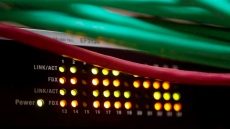SAN FRANCISCO — India's government has essentially banned a Facebook program that sought to connect with low-income residents by offering free access to a limited version of the social network and other Internet services.
The ruling is a major setback for Facebook CEO Mark Zuckerberg, who had lobbied hard for the program as part of a campaign to expand Internet access in developing countries. It's a victory for critics who argued that Facebook's "Free Basics" program gave unfair advantage to some Internet services over others.
Facebook has introduced "Free Basics" in partnership with wireless carriers in dozens of emerging nations, where the company hopes to get more people online. The service provides free access to a stripped-down version of Facebook and certain other Internet sites — including some that provide essential information like weather forecasts, health education and job listings.
But the program has sparked debate in some countries, particularly India, where critics contend that "Free Basics" effectively steers users toward Facebook and its partners, while making it harder for other Internet services — including homegrown startups — to build their own audiences.
In a much-awaited decision Monday, Indian regulators said telecommunications providers may not charge different or "discriminatory" rates for delivering different kinds of Internet content.

The ruling essentially bans programs like "Free Basics" that are based on what's known as "zero rating" in industry jargon, because they don't charge for downloading certain kinds of data.
In a statement, India's telecommunications regulatory authority said its decision was "guided by the principles of net neutrality," or the concept that all websites and apps should be treated equally by Internet access providers. Net neutrality advocates contend that charging different rates based on content is unfair both to consumers and to Internet services that are competing for consumers' attention.
U.S. regulators endorsed net neutrality in rules enacted last year, but those rules don't specifically ban carriers from exempting some services from data limits. The Federal Communications Commission is now studying the zero-rating issue.
Facebook said in a statement that it's disappointed with the ruling but will continue its efforts to increase Internet access. "Our goal with Free Basics is to bring more people online with an open, non-exclusive and free platform," the company said.

Zuckerberg had campaigned hard for the program, making personal visits to India and publishing an open letter in at least one newspaper there. Facebook also responded to critics of "Free Basics" last year by creating a new platform for outside developers to contribute apps for the program.
Facebook has about 130 million users in India. But like other U.S.-based Internet companies, it sees a huge opportunity to expand by reaching the estimated 1 billion Indians who don't have Internet access.
"Free Basics" is part of a broader effort, dubbed Internet.org, in which Facebook has also tried to work with phone-makers on designs that reduce data usage and extend battery life. In addition, the company is working on long-range projects to develop drones and satellites that deliver Internet service to remote areas.

Zuckerberg has acknowledged Facebook's business would benefit from gaining more users around the world, but he's also argued that Internet access is a powerful tool for economic development and improving lives in low-income regions.



